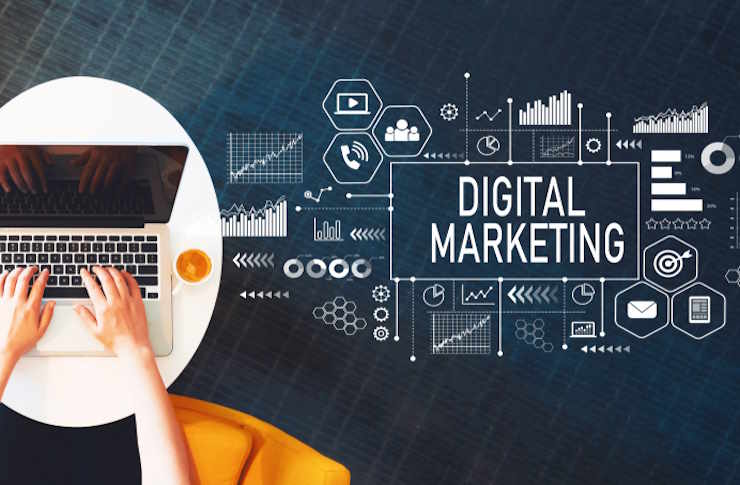Digital Marketing
In today’s connected world, businesses of all sizes rely on digital tools to grow their visibility and reach new customers. A modern marketing company no longer limits itself to traditional channels; instead, it embraces online platforms and technologies to deliver measurable results. This shift has made digital marketing one of the most dynamic industries in 2025.

What is a Digital Marketing Strategy?
A digital marketing strategy is a comprehensive plan that outlines how a company will use online channels to reach its target audience and achieve its business goals. This strategy typically encompasses various digital platforms and techniques, including search engine optimization (SEO), social media marketing, content marketing, email marketing, and pay-per-click advertising. An effective digital marketing strategy aligns with a company’s overall business objectives and is tailored to the specific needs and preferences of its target market.
How Can a Marketing Company Benefit from Digital Courses?
Marketing companies can significantly enhance their service offerings and expertise by investing in digital marketing courses for their employees. These courses provide up-to-date knowledge on the latest digital trends, tools, and best practices. By staying current with digital marketing techniques, marketing companies can better serve their clients and maintain a competitive edge in the industry. Additionally, digital marketing courses can help marketing professionals develop specialized skills in areas such as data analytics, content creation, and campaign management, which are highly valued in today’s digital-driven business environment.
What Role Does Product Advertising Play in Digital Marketing?
Product advertising is a crucial component of digital marketing, focusing on promoting specific products or services to potential customers through various online channels. In the digital realm, product advertising can take many forms, including display ads, video ads, social media promotions, and sponsored content. Digital marketing courses often cover effective product advertising techniques, teaching students how to create compelling ad copy, design visually appealing creatives, and leverage targeting options to reach the most relevant audience. Understanding the nuances of product advertising in the digital space is essential for maximizing return on investment and driving sales.
How Does a Digital Agency Differ from Traditional Marketing?
A digital agency specializes in providing marketing services specifically tailored for online platforms and digital technologies. Unlike traditional marketing agencies that may focus on print, television, or radio advertising, digital agencies offer a wide range of services centered around internet-based marketing strategies. These may include website design and development, search engine marketing, social media management, content marketing, and email marketing campaigns. Digital agencies often employ professionals with diverse skill sets, including web developers, data analysts, content creators, and digital strategists, to provide comprehensive solutions for their clients’ online marketing needs.
What Skills Are Taught in Digital Marketing Courses?
Digital marketing courses cover a broad spectrum of skills essential for success in the digital landscape. Some of the key areas typically addressed in these courses include:
-
Search Engine Optimization (SEO): Techniques to improve website visibility in search engine results.
-
Social Media Marketing: Strategies for effectively using platforms like Facebook, Instagram, and LinkedIn for business promotion.
-
Content Marketing: Creating and distributing valuable, relevant content to attract and engage a target audience.
-
Email Marketing: Developing and executing effective email campaigns to nurture leads and drive conversions.
-
Pay-Per-Click Advertising: Managing and optimizing paid advertising campaigns on platforms like Google Ads and social media.
-
Analytics and Data Interpretation: Using tools like Google Analytics to measure and analyze digital marketing efforts.
How Can Professionals Choose the Right Digital Marketing Course?
When selecting a digital marketing course, professionals should consider several factors to ensure they choose a program that aligns with their goals and learning preferences. Here’s a comparison of some popular digital marketing course options:
| Course Provider | Course Type | Key Features | Cost Estimation |
|---|---|---|---|
| Google Digital Garage | Online, Self-paced | Free certification, Comprehensive fundamentals | Free |
| Coursera (Various Universities) | Online, Structured | University-backed courses, Specializations available | $39-$79 per month |
| HubSpot Academy | Online, Self-paced | Industry-recognized certification, Focus on inbound marketing | Free |
| Digital Marketing Institute | Online or Blended | Global industry certification, Expert-led instruction | $1,368-$3,995 |
| Udacity Nanodegree | Online, Structured | Project-based learning, Career services | $399 per month |
Prices, rates, or cost estimates mentioned in this article are based on the latest available information but may change over time. Independent research is advised before making financial decisions.
Digital marketing courses offer valuable opportunities for professionals to enhance their skills and stay competitive in the rapidly evolving digital landscape. Whether you’re a marketing company looking to expand your service offerings, a product advertiser seeking to improve your online strategies, or an individual aiming to start a career in digital marketing, these courses provide the knowledge and practical skills needed to succeed in the digital age. By carefully selecting a course that aligns with your goals and learning style, you can gain the expertise necessary to navigate the complex world of digital marketing effectively.



